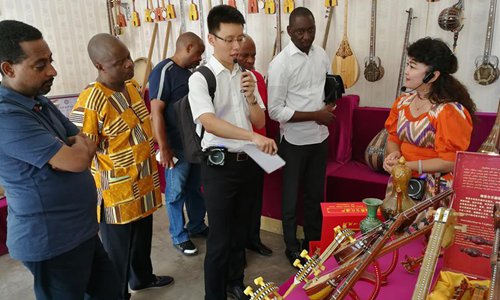HOME >> CHINA
US moves on Xinjiang to have little impact: experts
By Xie Wenting and Zhao Yusha Source:Global Times Published: 2019/10/9 23:38:40

A woman and her son check the condition of a pigeon in Kashgar, northwest China's Xinjiang Uygur Autonomous Region, Aug. 14, 2019. Many local villagers in Xinjiang have lifted themselves out of poverty through plantation and livestock breeding. Photo: Xinhua
Strong and effective retaliatory measures should be adopted against relevant personnel and companies of the US after Washington announced a series of decisions concerning Xinjiang, Chinese experts urged, noting the US move will have very little impact on China as achievements Xinjiang has made in recent years are obvious.
US Secretary of State Mike Pompeo on Tuesday announced visa restrictions on Chinese officials "believed to be responsible for, or complicit in, the detention and abuse of Uyghurs, Kazakhs, or other members of Muslim minority groups" in Xinjiang.
It follows the Trump administration's move on Monday which blacklisted 28 Chinese public security entities and companies allegedly involved in the surveillance and detention of minority groups.
The US moves prompted many Chinese experts to urge stronger and effective countermeasures against the US.
The economy is our trump card against the US, said Ni Feng, a deputy director of the Chinese Academy of Social Sciences' Institute of American Studies, citing China's own unreliable entity list as an example.
Another anonymous expert based in Beijing said that China is also mulling a blacklist of entry restrictions on relevant people and companies from the US. "Individuals and institutes who have bad records on China's issues will be included on the list," the expert said.
Broad criticism
The US moves also received wide criticism from Chinese and foreign experts on Xinjiang affairs.
If the US targets a country, concepts like human rights and freedom would only be used as political tools, said Erkin Öncan, a Turkish journalist who reports on Xinjiang, saying that the US puts forward the human rights card when it comes to issues with China. The reason for this is obvious. The issue of human rights is part of the US' anti-China agenda, just as the US has "brought democracy" to the Middle East.
Shu Hongshui, deputy dean of the anti-terrorism law department at the Northwest University of Political Science and Law, denied that Xinjiang suffers from so-called human rights abuse.
"It's another approach that the US adopts to contain China's rise," Shu said.
Visa restrictions on Chinese officials seriously violate the basic norms of international relations, interfere in China's internal affairs and undermines China's interests, said Geng Shuang, spokesperson of Foreign Ministry on Wednesday, noting that Xinjiang does not have the so-called human rights issue claimed by the US.
The Chinese Embassy in the US tweeted on Wednesday saying that "using human rights as an excuse, the US side has gone a step further today and announced visa restrictions on Chinese officials."
According to a white paper issued in July, Xinjiang's regional GDP rose from 791 million yuan ($117.91 million) in 1952 to 1.22 trillion yuan in 2018, an average annual growth of 8.3 percent. From 2014 to 2018, 2.31 million people including 1.89 million from southern Xinjiang, shook off the shackles of poverty. No terrorist attacks have happened in nearly three years.

Members of the UN envoys delegation visit a village known for ethnic instrument making in Shufu county of Kashgar, Northwest China's Xinjiang Uyghur Autonomous Region on August 31. Photo:Xinhua
Model program
In recent years, diplomats, scholars and journalists from many countries, including Russia, Pakistan, India, Thailand and Kazakhstan, have visited Xinjiang to have a first-hand experience of China's anti-terrorism efforts.
Many of them told the Global Times that Xinjiang's anti-terrorism and de-radicalization measures have helped international efforts in anti-terrorism, de-radicalization and human rights protection.
Yalini Saranya, a program officer at Bandaranaike Center for International Studies in Sri Lanka, who was among those who visited, told the Global Times that China's anti-terrorism measures, especially the vocational education and training centers, are very useful, and other countries can learn from them.
Saranya said he was amazed by the wide range of classes that the vocational education and training centers offer, such as make-up classes, electrician classes and tour guide classes, after she visited one center in Kashi, Southern Xinjiang in September.
By law, the anti-terrorism and de-radicalization measures adopted by China in Xinjiang are the concrete implementation of the UN Plan of Action to prevent violent extremism, and in full compliance with laws and the Constitution, which are in line with international practices, Shu said.
US officials and journalists just keep on criticizing China' policies on Xinjiang without verifying the facts, which shows that their true intention is not to help Xinjiang, He Zhipeng, a professor of international human rights and legal education at Jilin University, told the Global Times.
He said the decisions will have little impact on China. "Even US allies don't follow whatever the US tells them to do. Any deliberate or vicious attack on Xinjiang will backfire," He said.
Posted in: SOCIETY